Students spend their mornings in Core Classes focusing on their concentration: Acting for the Camera, Production, or Screenwriting. Check out each track’s description below for more information. After lunch, students take Elective classes which allow them to explore film through:
- Hands-on production classes, like editing and cinematography
- Writing and acting classes, like how to write a T.V. pilot, improvisation, and directing actors
- Genre classes like horror films, film noir and queer cinema
Students will take 4 total electives: 2 in the first two weeks and 2 in the second. Afternoons in the final week will be devoted to capstone film projects and masterclasses. Evenings are filled with screenings, practical application through student film production, lectures, master classes, and POD guided interdisciplinary experiences throughout the summer.
Students collaborate on film projects every weekend, giving them an opportunity to apply what they are learning in class to an actual film experience with their peers. These weekend projects also help prepare them for their capstone film projects.
All three concentrations work together to craft multiple capstone projects in the final phase of the Institute. These Capstone Films are screened for friends and family on the final day in our “Festival of First Cuts“. Acting on Camera students perform in films written by Screenwriting students and produced by Production students. All students will participate in these projects from concept to realization, as well as occasional in-class participation whenever possible. You can watch a sampling of past students’ work on our Sample Film Work page.
Acting on Camera
Through our Acting on Camera Core Curriculum, students will begin to harness their instincts into a technique that generates an on screen presence unique to them as performers. Mornings will consist of advanced, concentration-specific curriculum taught by industry professionals who are thoughtful educators. Through a mix of ensemble, partner, and individual work, Acting students will explore a variety of acting methods and gain a multitude of tools that will endow them with a new level of confidence and professionalism as performers. Examples of past topics of study include:
- Acting Theory
- Scene Study
- Monologue Work
- Movement
- Character Work
- Performance Approaches
- Working with the Director
- Blocking for the Camera
- Auditioning
- Acting for Commercials
Acting for the camera is a technical craft as well as an art. Understanding how to “work the camera” as an actor is key.
Production
Production students focus on the techniques used in the creation and manipulation of motion pictures. Through the Production Core Curriculum, students will explore cinematography, editing, sound, directing, and various other film production roles in order to collaborate on a multitude of film projects throughout the summer.
The Production Concentration is intentionally “hands-on” and students will learn to use and master professional filmmaking tools in an effort to tell their unique stories. NHSI equipment includes access to the same high-quality grip and electric gear used by Northwestern Radio-Television-Film students.
Production students learn and practice the principles of blocking, staging and visual composition, cinematography principles (framing, lenses, lighting), shotlisting and in-depth scene analysis (scene beats, turning points, structure of a scene, visual expression of conflict), as well as various tools and methods for directing actors (acting beats, action verbs, emotional strategies), gaining practical knowledge to help them translate a vision into cinematic language and shape their idea from script to screen.
From pre‐production to post‐production, from cinematography to sound, each student will prepare, shoot, and edit several exercises, in order to find their own artistic voice through cinema. Though a largely hands-on curriculum, the students will also be exposed to masters and innovators of filmmaking spanning the history of cinema in the world. This study will go beyond the technical teaching of cinematography and directing and inspire students to become engaged and analytical viewers who continue to learn long after the term is over.
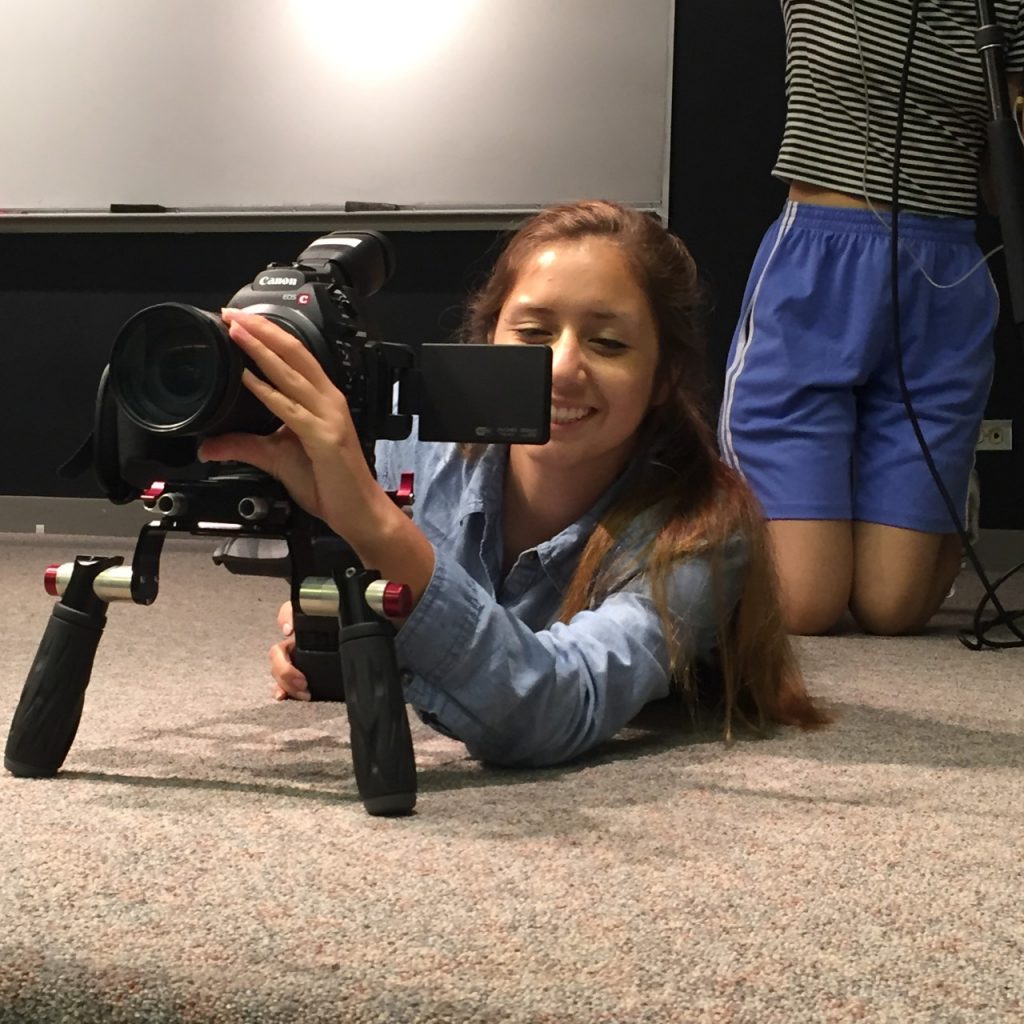
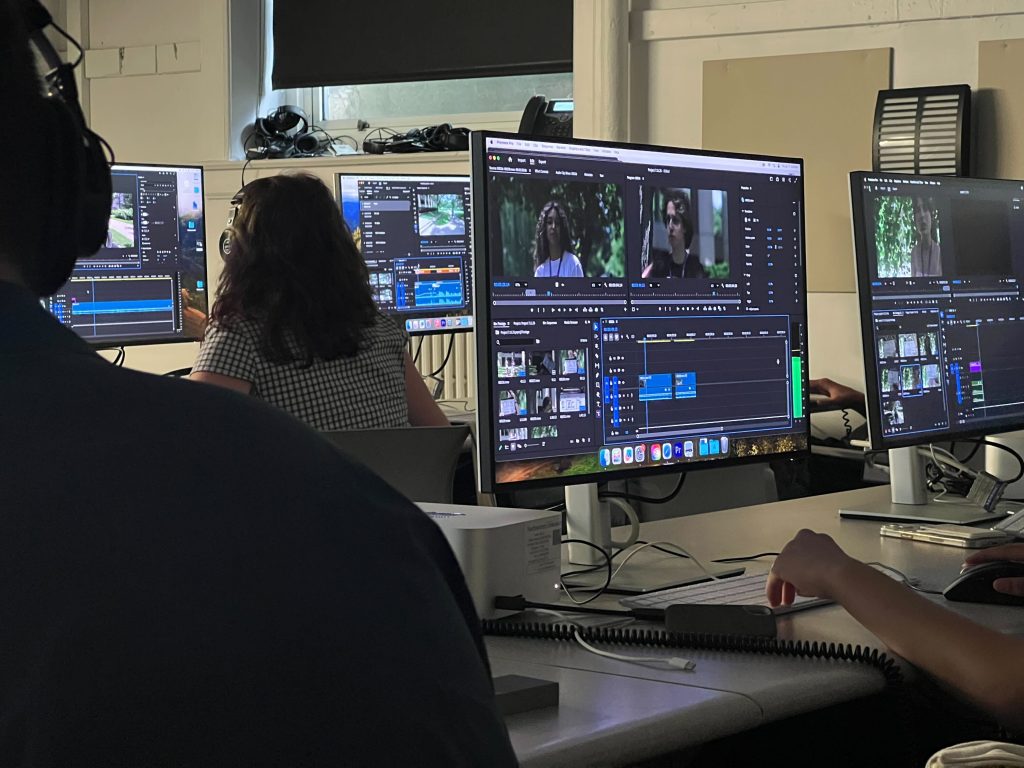
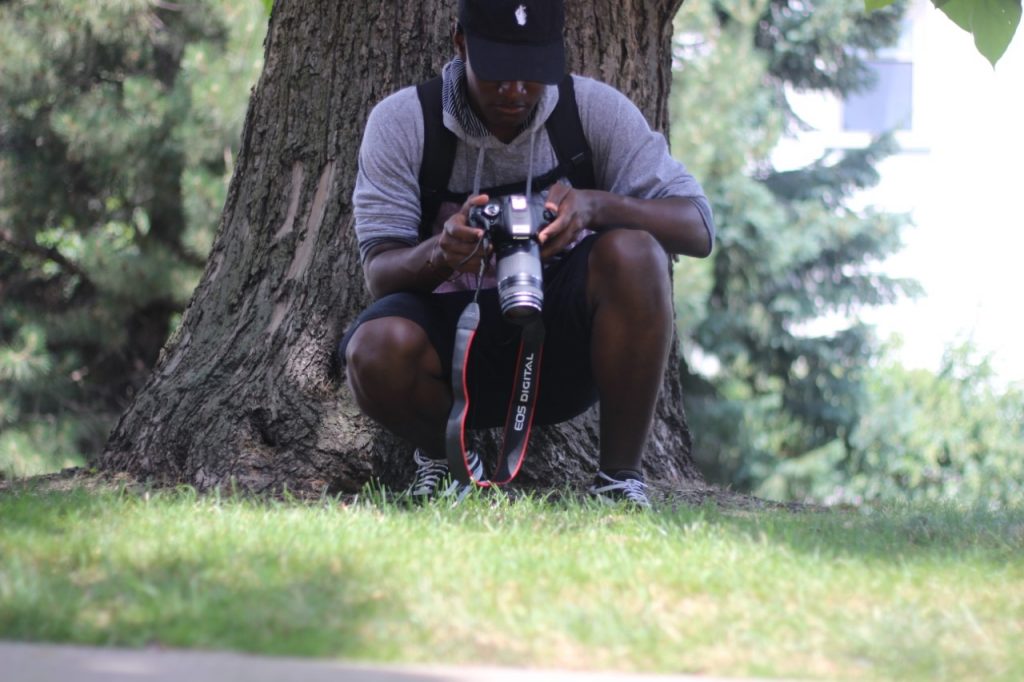
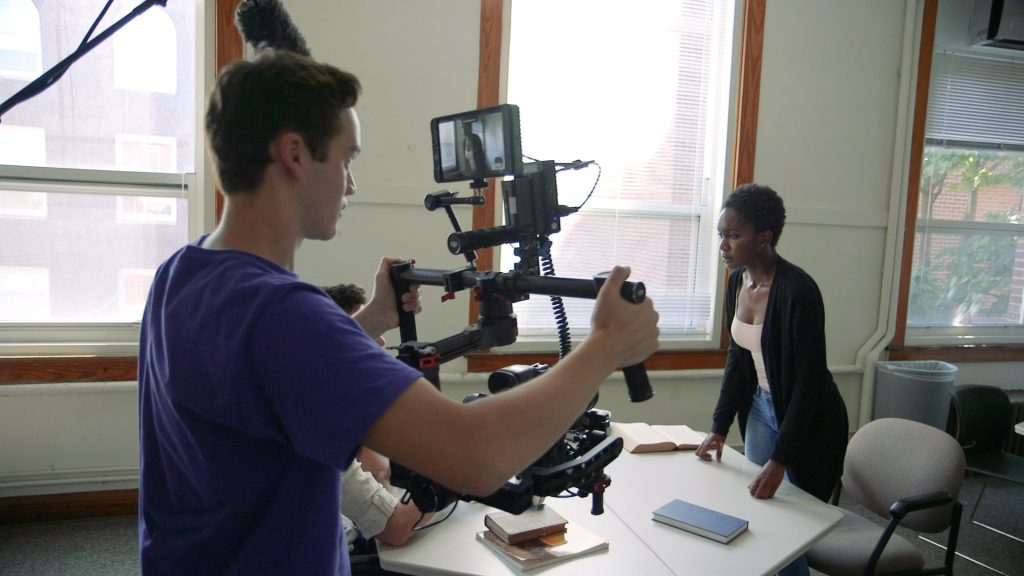
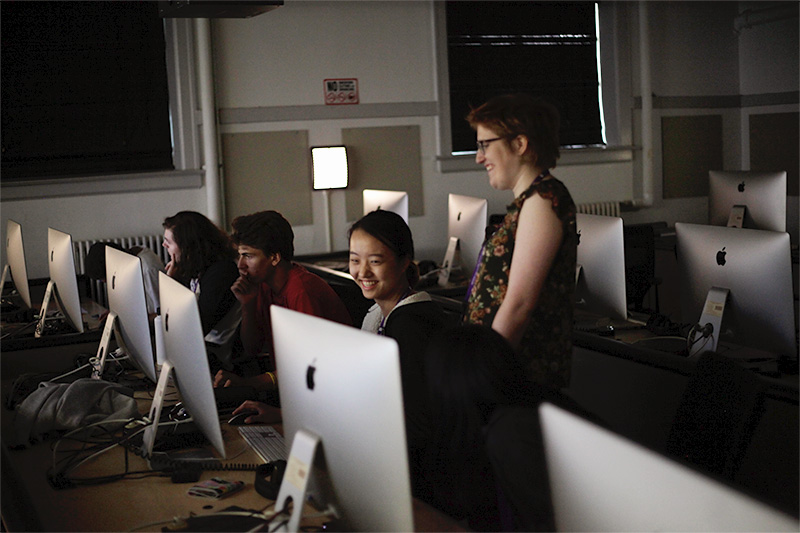
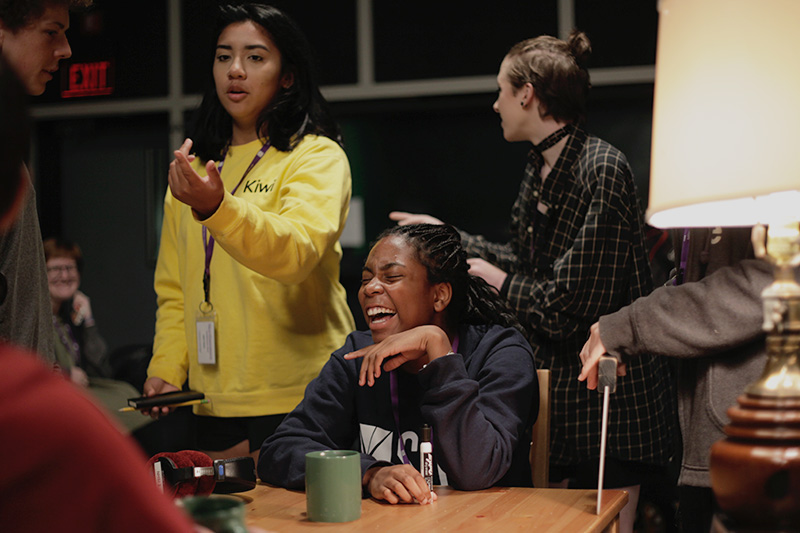
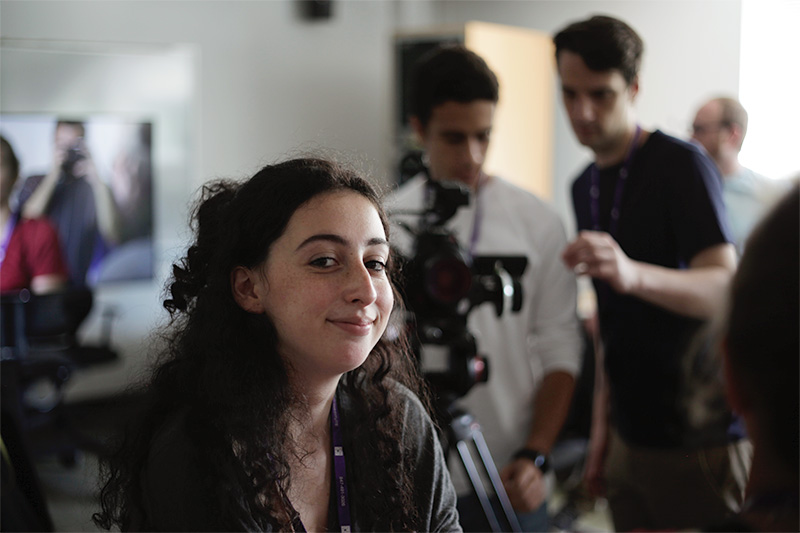
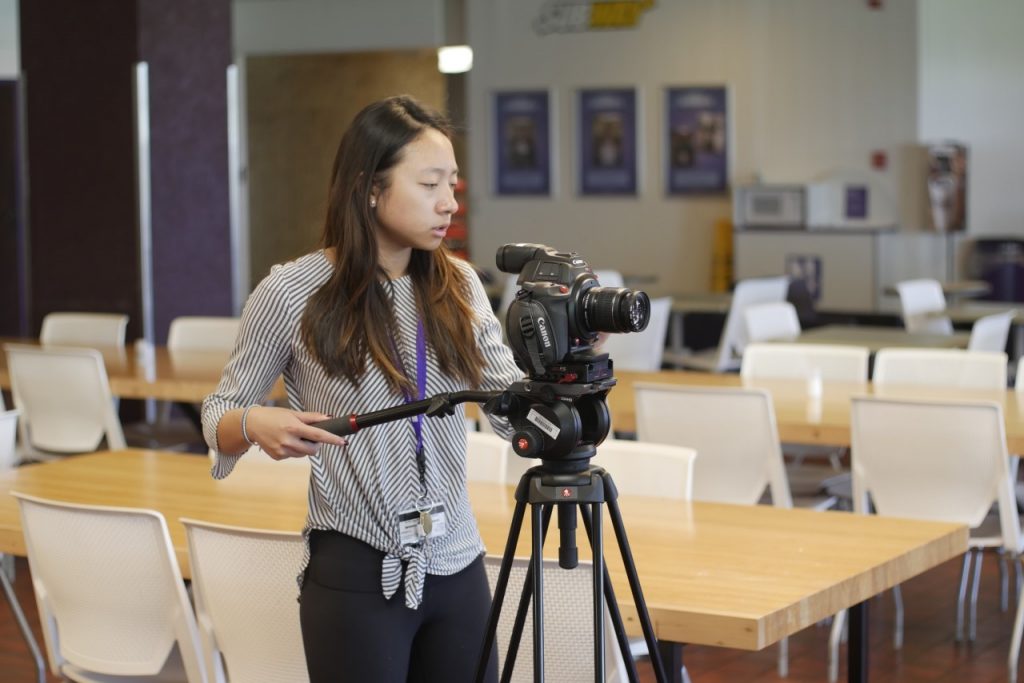
The Production concentration of the Film & Video Institute is comprehensive, collaborative, and hands-on.
Screenwriting
The Screenwriting Core Curriculum concentrates on the life of a screenwriter: the skills a writer needs to forge a career in the industry, the industry-accepted software and formatting, industry trends, the basics of drama, genre conventions, exploration of Hollywood conventional three act story structure, and analysis of classics both old and new.
Attention is also paid to discovering and nurturing the writer’s own “voice.” Through daily writing exercises, scene work, and writer’s room collaboration, students will hone in on the story they want to write and why they are the only/best person to tell it. This is a crucial factor in learning how to tell that good story well.
Screenplays are the blueprint that guide production, and therefore the screenwriter must learn all the roles and necessary language of film production. Afternoon elective classes, evening workshops, and lectures expose the screenwriter to the other disciplines and aspects of film production; everything from directing actors to film editing.
As the classes move toward the ultimate goal (a five-minute screenplay filmed during Production Week), every student will create an original premise for their Capstone project, thorough character biographies, complete story structure, and scene outlines. The end result is a beginning-to-end experience of the working screenwriter, only better because the movie gets made!
By the end of the summer, Screenwriting students should:
- Understand the process of developing a story for the visual medium
- Be familiar with various screenplay structures and forms
- Comprehend the importance of character in relation to plot
- Appreciate the script’s contribution to a successful film
- Better understand the necessary elements of screenwriting (cohesive action, dialogue, etc.)
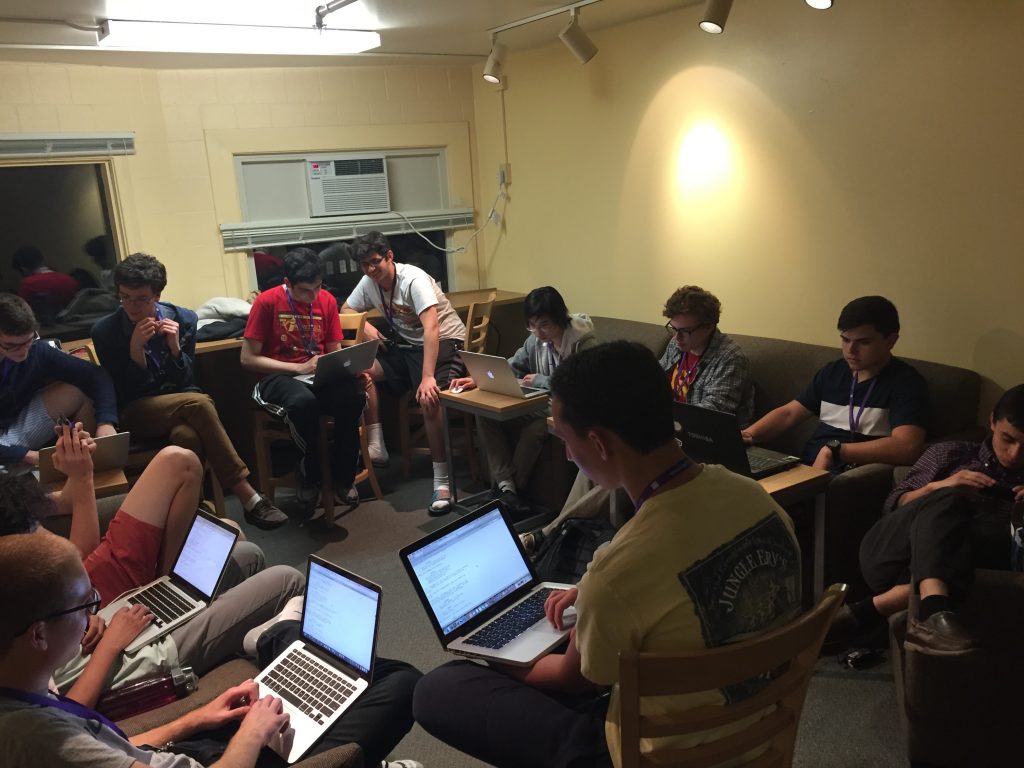


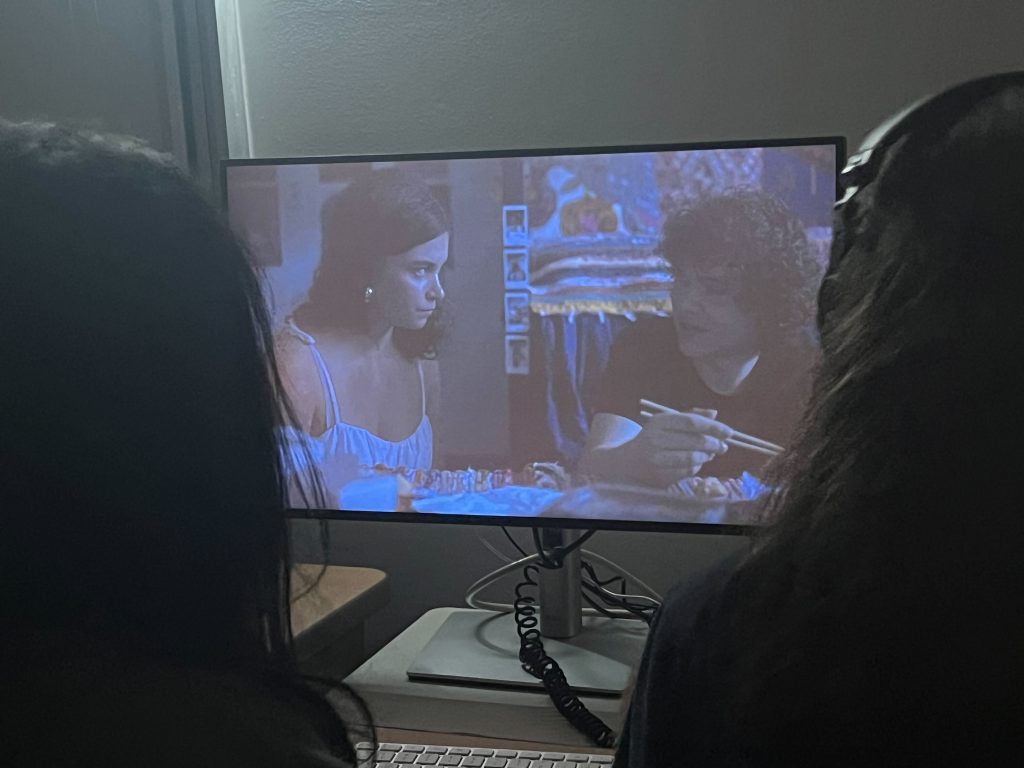
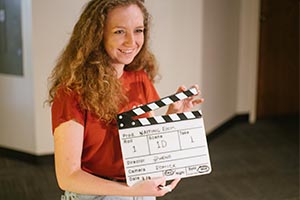
“A good story well told”: Screenwriting students study fundamentals of storytelling and screenplay structure, gaining an understanding of the most important part of any film: the story.
Please take some time to review the daily schedule below and consider time commitment that the Institute requires. The program is a Film Intensive, and the schedule does not allow for many outside activities. Be thoughtful in considering your interest in the rigorous schedule of the program.
Times and structure are subject to change.
|
7:30-8:30am
|
Breakfast
|
|
8:45-9:25am
|
All Institute Meeting
|
|
9:30 – 11pm
|
Acting Core 1
|
|
11:15 – 12:45
|
Acting Core 2
|
|
12:45-1:30pm
1:30-2:30pm |
Lunch
Afternoon Break |
|
2:30-4:00pm
|
Elective Class 1
|
|
4:10 – 6:00pm
|
Elective Class 2
|
|
6:00 – 7:00pm
|
Dinner
|
|
7:30 – 10:00pm
|
Master Classes/Film Screenings/Study Halls/Extracurriculars
|
|
10:30pm
|
Dorm Closing
|
Weekend schedule may vary. Students will take part in “Weekend Projects” which will involve collaborating on a film for most of the day.
Times and structure are subject to change.
|
7:30-8:30am
|
Breakfast
|
|
8:45-9:25am
|
All Institute Meeting
|
|
9:30 – 11pm
|
Production Core 1
|
|
11:15 – 12:45
|
Production Core 2
|
|
12:45-1:30pm
1:30-2:30pm |
Lunch
Afternoon Break |
|
2:30-4:00pm
|
Elective Class 1
|
|
4:10 – 6:00pm
|
Elective Class 2
|
|
6:00 – 7:00pm
|
Dinner
|
|
7:30 – 10:00pm
|
Master Classes/Film Screenings/Study Halls/Extracurriculars
|
|
10:30pm
|
Dorm Closing
|
Weekend schedule may vary. Students will take part in “Weekend Projects” which will involve collaborating on a film for most of the day.
Times and structure are subject to change.
|
7:30-8:30am
|
Breakfast
|
|
8:45-9:25am
|
All Institute Meeting
|
|
9:30 – 11pm
|
Screenwriting Core 1
|
|
11:15 – 12:45
|
Screenwriting Core 2
|
|
12:45-1:30pm
1:30-2:30pm |
Lunch
Afternoon Break |
|
2:30-4:00pm
|
Elective Class 1
|
|
4:10 – 6:00pm
|
Elective Class 2
|
|
6:00 – 7:00pm
|
Dinner
|
|
7:30 – 10:00pm
|
Master Classes/Film Screenings/Study Halls/Extracurriculars
|
|
10:30pm
|
Dorm Closing
|
Weekend schedule may vary. Students will take part in “Weekend Projects” which will involve collaborating on a film for most of the day.
